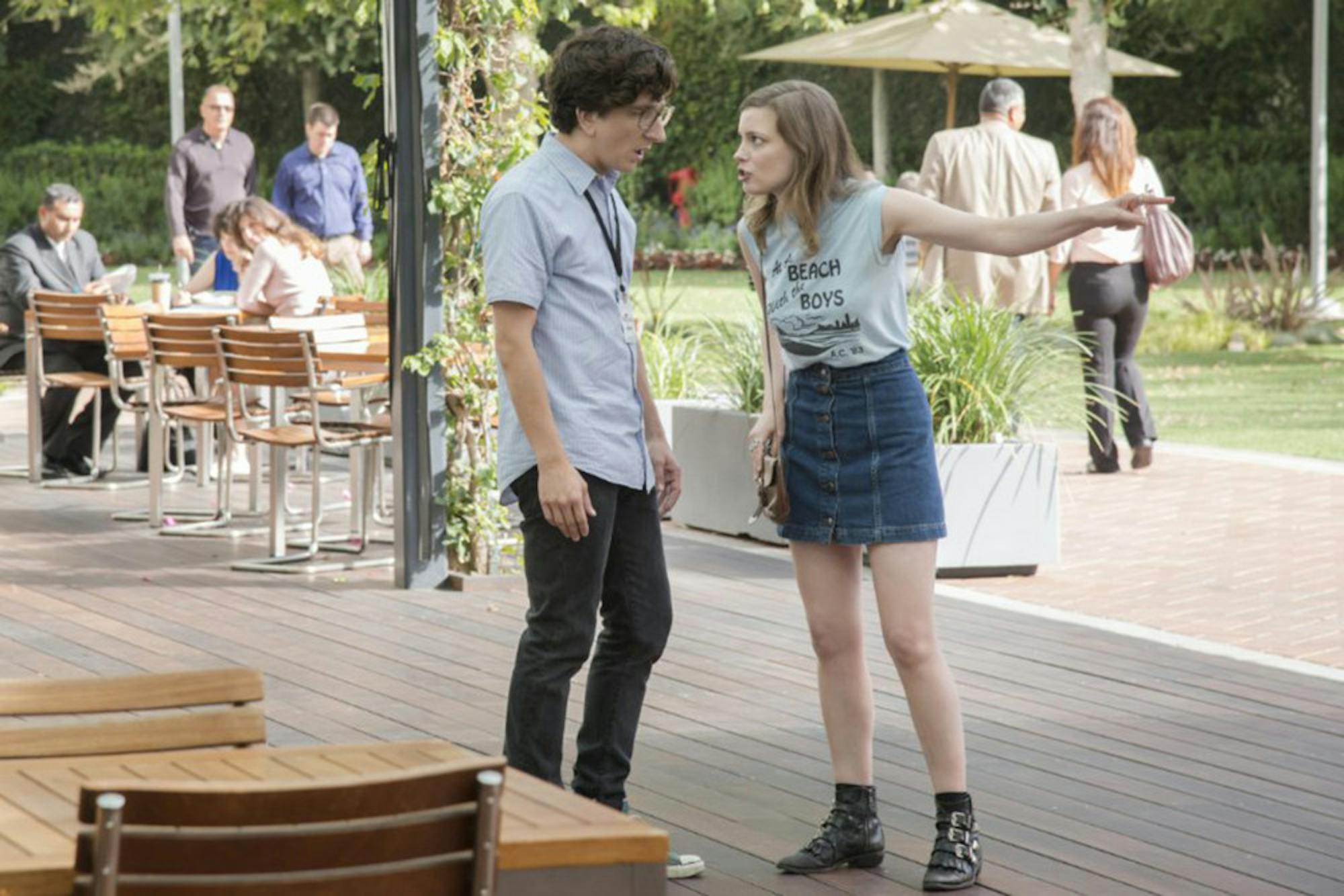Judd Apatow, icon of the ‘bromantic comedy,' has joined creative forces with Lesley Arfin and Paul Rust to tackle the complexity of modern dating in a new Netflix original series, "Love" (2016 - present). The series, which is akin to the Aziz Ansari comedy "Master of None" (2015 - present) and even more so to HBO’s "Girls" (2012 - present), presents 21st-century relationships through a lens that is far from rose-tinted. The results are mixed.
The entirety of the first season debuted online on Feb. 19th, with a 12-episode second season already ordered for next year. The show stars "Community's" (2009 - 2015) Gillian Jacobs as Mickey, a 32-year-old dysfunctional alcoholic who works for a relationship advice radio show and Paul Rust (of 2009's "I Love You, Beth Cooper") as Gus, a middling tutor on a TV set who, in the opening scenes of the first episode, is broken up with for being “too nice.” Both characters are portrayed to be unlikeable in the first episode and remain that way, even increasingly so, but as the season wears on, it is difficult to not appreciate the unabashed honesty and awkwardness.
However, the show truly shines in the supporting and minor roles of Australian comic Claudia O’Doherty, who infuses scenes with bright (and often brash) humor as Bertie, Mickey’s roommate. Her upbeat nature and ability to take both Mickey’s dysfunctionality and Gus’s egotism in her stride, and with cheek, easily make her a highlight of the show. Other characters more charming than repellent include Gus’s neighbors Allan and Frank, played by Dave Allen of "Freaks and Geeks" (1999 - 2000) and Steve Bannos respectively, and his friend Cori, played by Charlene Yi (2009's "Paper Heart"). The supporting characters are not relegated to background characters, and as the two protagonists descend into self-destruction, their friends and coworkers are given a chance to develop in complexity.
"Love" opens itself up to criticism from a social perspective, as it features many of the tropes prominent in Apatow’s films and other male-centric romantic comedies in general. Gus is a typical “nice guy”— his kindness is often masking an entitlement (his ex-girlfriend decries him as “fake nice” in the second episode). Apatow, Arfin and Rust have succeeded in penning a flawed character, and acknowledge that much of his kindness is just a facade, but throughout the season they manage to perpetuate the "nice guys finish last" myth. In addition, there exists the element of wish fulfillment that is also pervasivein Apatow’s films. Gus is immature, gawky and not particularly attractive, yet has multiple statuesque women lusting after him throughout the season, even as he becomes increasingly obnoxious.
Also typical of Apatow and co-creator Lesley Arfin (who has written for MTV’s "Awkward" (2011 - present) and HBO’s "Girls"(2012 - present)), the Netflix series is filled with amusingly cringe-worthy moments, usually courtesy of Rust’s awkwardness. "Love" is also peppered with ridiculous, laugh-out-loud scenes, like Mickey’s sassafras-fueled bender with human catastrophe Andy Dick (playing himself) and a tattooing gone-wrong at a Hollywood Hills house party.
Many critics have stated that this show is not as "binge-able" as most other Netflix originals and that assertion has merit. The pacing of the show occasionally drags on and rarely does an episode end leaving the viewer eagerly anticipating the next one. Nevertheless, standalone episodes are good television with poignant, too-relatable moments and clever comedy.
The show reaches its comedic peak in a mid-season episode, “The Date,” where Mickey pressures Gus and Bertie to go out to dinner together, inevitably culminating in hilarious disaster. The director of the episode, Maggie Carey of "The To Do List" (2013), is one of many acclaimed comedy directors on the show’s roster. Others include "Parks and Recreation's" (2009 - 2015) Dean Holland and Michael Showalter of "Wet Hot American Summer" (2001).
Indeed, "Love" does not suffer from lack of talent—whether acting, writing or directorial. Its shortcomings are much more elusive. Unlike "Orange is the New Black" (2013 - present) and "House of Cards" (2013 - present), "Love" is a Netflix original that lacks truly memorable moments, lines and characters. The show is not a bad breakup or even a bombed date. It’s more like the guy you met once at a party and exchanged numbers with, but never called. You clicked, you had a good time but in the end, he was easily forgettable.
Swipe left on Apatow’s 'Love'

Paul Rust and Gillian Jacobs in "Love."
Summary
Despite comedic talent involved in its production, unlikeable characters and slow pacing make 'Love' forgettable TV.
2.5 Stars





